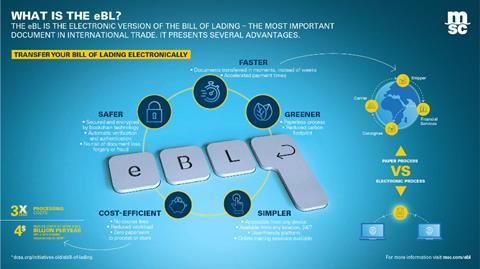Following a successful pilot phase, MSC Mediterranean Shipping Company (MSC) is introducing an electronic bill of lading (eBL) on the independent blockchain platform WAVE BL.

The eBL enables shippers and other key supply chain stakeholders to receive and transmit the bill of lading document electronically, without any change or disruption to day-to-day business operations, said MSC.
The blockchain-based system uses distributed ledger technology to ensure that all parties involved in a cargo shipment booking can issue, transfer, endorse and manage documents through a secure, decentralised network. WAVE BL’s communication protocol is approved by the International Group of Protection & Indemnity Clubs, and meets the highest industry standards for security and privacy, added MSC.
“MSC has chosen WAVE BL because it is the only solution that mirrors the traditional paper-based process that the shipping and cargo transportation industry is used to,” said André Simha, global chief digital and information officer at MSC. “It provides a digital alternative to all the possibilities available with traditional print documents, just much faster and more secure.”
Identifying an eBL solution as a critical step in the overall digitalisation of the industry, Simha, who is also the chairman of the Digital Container Shipping Association (DCSA), commented: “Traditionally, the shipping industry has relied quite heavily on physical paper documents. And among these, the bill of lading is the most important transport document in international trade.
“While there have been attempts to create an eBL solution in the past, we are now in a position to introduce a solution that can pave the way to mass eBL adoption, which will mean significant savings for the shipping industry.”
DCSA research indicates that by achieving just 50 percent eBL adoption by 2030, the industry could potentially save more than USD4 billion per year.
The solution also enables faster document transfers, which in turn, leads to a shorter payment cycle – and electronic processes are far less susceptible to forgery, fraud, loss or human error.
Simha continued: “Eliminating paper from the shipping transaction will make every aspect of commercial container shipping better, faster, more effective, more secure and environmentally-friendly.”
The WAVE BL platform can be used free of charge throughout 2021 for exporters, importers and traders. MSC said that users only pay for issuing the original documents, and they do not need to invest in any IT infrastructure or make operational changes in order to use the service. They can simply sign up via MSC’s website.
















